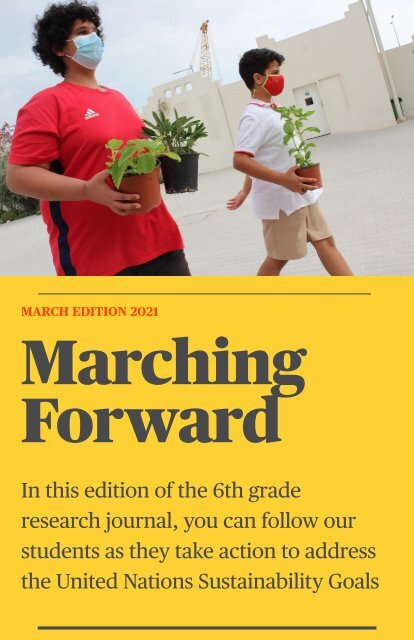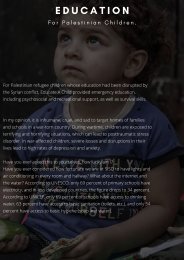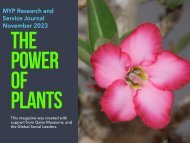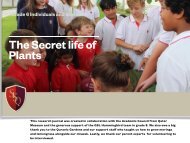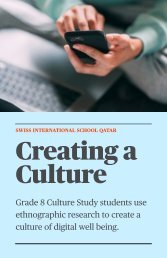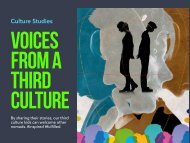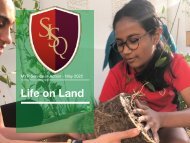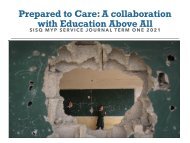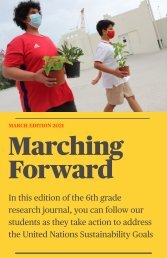Marching Forward
Welcome to the March 2021 edition of our 6th grade research journal.
Welcome to the March 2021 edition of our 6th grade research journal.
Create successful ePaper yourself
Turn your PDF publications into a flip-book with our unique Google optimized e-Paper software.
MARCH EDITION 2021<br />
<strong>Marching</strong><br />
<strong>Forward</strong><br />
In this edition of the 6th grade<br />
research journal, you can follow our<br />
students as they take action to address<br />
the United Nations Sustainability Goals
Partnering for the Goals<br />
BY 6TH GRADE ........................................................... 5<br />
<strong>Marching</strong> <strong>Forward</strong><br />
...................................................... 6<br />
AL SAFWA FARMS JOINS THE HUMMINGBIRDS 10<br />
FUME BUSTERS (WHO YOU GONNA CALL?) BY<br />
GRACE A, GRACE M, OLIVER M AND SHREEDHAR.<br />
14<br />
WRIGGLY WONDERS BY METE, BRIEUC, ETHAN<br />
AND MATHIAS .......................................................... 18<br />
EARTHWORMS: WHAT ARE THESE TINY WIGGLY<br />
CREATURES? BY SIMRA ........................................... 25
FOOD SUSTAINABILITY IN QATAR BY TAREQ ..... 35<br />
Hummingbird Heroes .............................................. 42<br />
In our next editions: ................................................. 43
Would you like to know more about why this team of<br />
hummingbirds looks so proud? Or maybe you would like to<br />
know why we are all holding plants? <br />
If you have been following our research in our previous<br />
journals then you know that our students have been<br />
inspired to protect pollinators and make ethical choices.<br />
Little did we know that we were about to make some new<br />
allies who would help us to do our part in achieving<br />
Qatar’s vision for 2030 and the United Nations sustainable<br />
development goals...
<strong>Marching</strong> <strong>Forward</strong><br />
By 6th grade <br />
The National Vision of Qatar outlines environmental<br />
development as one of pillars of sustainable growth for Qatar.<br />
In this issue, we will explore the importance of food security<br />
for Qatar as well as how our students are collaborating with<br />
local organisations to become a living part of this exciting<br />
initiative.
<strong>Marching</strong> <strong>Forward</strong><br />
The mission statement for Swiss International School<br />
proudly declares that our students are “inspired”,<br />
“challenged” and “prepared”<br />
The hours of hard work and research that has gone into<br />
Service in Action this month proves that our MYP students<br />
are not only inspired to learn outside of the classroom but<br />
also prepared to do their part in leaving a legacy for future<br />
generations - even though they are still children themselves!<br />
“The pandemic is a portal”<br />
On the 22nd February, we were invited to present our<br />
research to schools from across Qatar and even a school in<br />
Dubai at The Portal Conference hosted by the American<br />
School of Doha.<br />
The idea of The Portal was inspired by a poem about<br />
Covid called “The Pandemic is a Portal” by Arundhati Roy.<br />
Roy reminds us that the virus provides a wake up call to<br />
examine our priorities. This beautiful quote summarises it<br />
beautifully:<br />
“We are collectively faced with a need for deep<br />
feeling, solidarity, and action”
At The Portal Convention, we were inspired by Carl<br />
Wilkens, author of “I’m Not Leaving”. Carl was the only<br />
American who stayed during the Rwandan genocide<br />
because he realised that, once the adults were murdered,<br />
there would be lots of vulnerable children and he couldn’t<br />
leave them to die.<br />
Our students listened in fascination as Carl reminded us<br />
that there is hope and light in even the darkest situations<br />
and we need to believe in our collective power to make a<br />
difference.<br />
But that was just the beginning!
5 groups of MYP<br />
students<br />
presented their<br />
service in action<br />
research and we<br />
got to listen to<br />
other students<br />
who were doing<br />
what Carl<br />
Wilkens had<br />
been describing: bringing hope and light to the dark<br />
situation caused by Covid.<br />
<br />
<br />
Not only can we reach out and partner with other young<br />
people in Doha so that we can share our skills and<br />
experience, but we have also been asked to share our
presentations with Eco-Schools Qatar so that they can<br />
publish our learning throughout Doha.<br />
All of this happened because our students were willing to<br />
put in extra time and energy to create their presentations.<br />
They were challenged to speak in front of total strangers<br />
and inspired to continue learning more once the<br />
conference was over.<br />
We are naturally incredibly proud of them.<br />
On behalf of all the GSL teams, we would like to thank the<br />
following people who made this event possible for us:<br />
Marcia Jones, Chi-Yan Shang and Mary May from The<br />
American School of Doha for<br />
organising the event.<br />
Lou Gillard and Lewis<br />
Macdonald for supervising<br />
and supporting students with<br />
their speeches.<br />
Ruba Benini for the much<br />
appreciated snacks.<br />
Look at the difference<br />
between healthy soil and<br />
barren sand.
Al Safwa Farms Joins The Hummingbirds<br />
Could you imagine trying to farm in Qatar? Now<br />
imagine trying to provide enough food for the nation<br />
with only 100 mms of water per annum.<br />
A number of our 6th graders were fascinated by this<br />
topic. Tareq researched how important food security was<br />
in the blockade, Mohammed Ali wrote about farms like<br />
Baladna but our students weren’t really aware of any farms<br />
that were proudly ethical and organic.<br />
Perhaps, this simply wasn’t possible here?
Despite the harsh<br />
farming conditions<br />
in Qatar, there are<br />
1300 farms who<br />
manage to survive<br />
on desalinated<br />
water and Al Safwa<br />
products come<br />
from a farm that<br />
has been operating<br />
since 1975.<br />
What makes the<br />
farm so interesting<br />
and fascinating is<br />
that their food<br />
production<br />
techniques are<br />
ethical and sustainable. Wahat Al Shafalahia was<br />
established in 1975 as the Al Fardan family farm and today<br />
they are actively inspired to provide the healthiest foods to<br />
the Qatari people in line with the 2030 Vision for Qatar.<br />
That means no pesticides, no dangerous chemicals and<br />
ethical treatment for all animals. Al Safwa products are<br />
100% organic. And in order to preserve precious resources,<br />
many Al Safwa products are produced using hydroponics<br />
which prevents up to 80% of water loss.<br />
You can imagine our delight when Al Safwa contacted<br />
us and invited us to share our research with them.
Not only, did they listen to<br />
our dreams for a<br />
biodiversity garden, they<br />
taught us how to mix the<br />
soil, peat moss and coco<br />
substrate ( a very important<br />
skill for carbon capture) and<br />
they donated the most<br />
amazing organic plants.<br />
Have a look at how<br />
their soil expertise<br />
have helped our<br />
students to make the<br />
desert bloom:
Thanks to the generous support of Mr<br />
Fardan Al Fardan, our students have<br />
realised their dream of having a<br />
sustainable biodiversity garden and<br />
they will also be learning<br />
hydroponics.<br />
In exchange, the students will<br />
continue sharing their research with<br />
their new partner and we hope that<br />
our friends in Al Safwa enjoy our<br />
research in this edition.
Fume Busters (Who you gonna call?) by<br />
Grace A, Grace M, Oliver M and Shreedhar.<br />
The Fume Busters are a group that have entered the<br />
Global Social Leaders to address the issue of carbon<br />
pollution in Qatar.<br />
In class, we learned how Qatari life expectancy has<br />
increased enormously since 1945 due to massive economic<br />
progress. Qatar now has amazing hospitals and airports but<br />
all this development has come at a price.<br />
The air pollution is alarming and due to get a lot worse<br />
due to all the construction for the World Cup. To make<br />
matters worse, the population is drastically increasing and<br />
this means that there is an increase in energy needs and<br />
more carbon emission.
Zoom has become really useful in the past year, although<br />
a recent study has shown that just 1 hour of high definition<br />
Zoom produces the equivalent CO2 of driving 26 km. To<br />
put this into perspective: from Qatar Mall to Festival City is<br />
25.9km. On top of this, high definition zoom calls produce<br />
2.8kg per hour over 250 days.From this data I have found<br />
out that a school of 500 children would produce 700 kg of<br />
carbon per year if they met for only an hour a day. If they<br />
were online for the entire day, they would produce 3500kg<br />
of carbon. To put into perspective, a BMW I3 weighs 1,195kg<br />
meaning for every year a small school is producing 2<br />
BMW’s.<br />
Meanwhile, a tree only consumes 10kg of carbon a year.<br />
We think that the answer lies in carbon capture<br />
gardening. Could the soil of our school capture the carbon<br />
that we are producing?
What is a carbon capture garden? Well a carbon capture<br />
garden is a garden with a bunch of plants that breath in the<br />
CO2 as well as being places for recreation and wildlife.The<br />
best thing about carbon gardens are that they absorb CO2<br />
and that is good because today we use a lot of factories for<br />
toys and other products we don’t necessarily need.The CO2<br />
gardens clean the air around us.<br />
We need CO2 gardens because CO2 is a greenhouse gas<br />
and greenhouse gasses are very bad for the environment<br />
and for our health.CO2 gardens won’t just solve the<br />
problem on their own - we will need a better plan but the<br />
CO2 gardens are a great way to help clean the air.<br />
We really need CO2 gardens because of all the things we<br />
do to the air and to the atmosphere.CO2 can pollute the air<br />
and CO2 is very poisonous so if there is a lot in the air then<br />
we could potentially damage our mental health and<br />
possibly our physical health. <br />
When Al Safwa donated soil, coco substrate and peat<br />
moss, we discovered that the soil itself could capture<br />
carbon and we are now actively pursuing composting<br />
and permaculture as a way to increase our carbon<br />
capture. A big thank you to Mrs Farhana Raquib for<br />
helping us with the composting.<br />
Another way that we can address our carbon<br />
consumption is by examining our tissue use. Due to Covid,<br />
we now use tissues to disinfect our learning areas. We<br />
cannot recycle these tissues.
If we were to estimate how many tissues one person uses<br />
for a lesson it will be 4-6 due to cleaning the tables before<br />
and after, if we estimate how many tissues one child is<br />
using in grade 6 they are using 40 tissues a day. Every week<br />
will be 280 tissues which if we estimated there were around<br />
54 pupils in our grade 2160 tissues are being used and that<br />
is just in grade 6 and 15,120 tissues a week but including the<br />
fact ⅕ of our grade are online everyday from Sunday to<br />
Thursday.<br />
You may ask how is this increasing our carbon footprint?<br />
It’s increasing our carbon footprint by cutting down more<br />
trees and these tissues we can’t reuse because of covid<br />
guidelines and being wet from disinfectant.<br />
We have a number of responsible students who have<br />
volunteers to bring cloths to school that they can wash<br />
daily and we are working on a plan with Mrs Olivier to do<br />
this safely and responsibly so this is another small way to<br />
minimize our carbon footprint.<br />
https://daily.jstor.org/five-steps-to-making-your-garden-acarbon-sink/<br />
#:~:text=Gardens%20can%20be%20very%20efficient,it%20i<br />
n%20soils%20and%20plants.&text=of%20Concerned%20Sc<br />
ientists.-,The%20key%20to%20locking%20up%20carbon%2<br />
0is%20soil%2%80%94and%20there,making%20that%20soi<br />
l%20store%20carbon. <br />
https://gerrymcgovern.com/the-hidden-pollution-cost-ofonline-meetings/
Wriggly Wonders by Mete, Brieuc, Ethan<br />
and Mathias<br />
Worms are another amazing way to reduce our carbon<br />
footprint as they can trap carbon in the soil. Part of the<br />
Fume Busters team has focused on how we can use<br />
vermiculture and composting to support the<br />
hummingbirds and capture our carbon.<br />
Worms are animals that are normally quite long, they are<br />
shaped in cylindrical tube form it as no limbs, no legs, no<br />
arms and no eyes. As you can see in the photo there worms<br />
have loads of organs (brain, heart, anus, etc…).<br />
They also have ventral nerve cords and they have really<br />
small hairs used for protection and for locomotion. They<br />
also have a very important part of the body and that is<br />
called a clitellum. The clitellum is a big layer of skin and
usually it has a light pigment. This is where the eggs are<br />
kept.<br />
How can worms be helpful?<br />
Worms can be helpful because when they eat they leave<br />
behind castings that are really good for fertilizing<br />
soil.Worms help the water in the soil flow nicely to the roots<br />
of plants and worms help the increase of air that gets into<br />
the soil.The worms bring down organic matter from the top<br />
into the soil and they mix it around with the soil below.<br />
Helpful worms <br />
Are worms harmful? <br />
<br />
Worms can look disgusting and harmful. You might think<br />
they are going to do something bad to you but worms are<br />
pretty calm and unharmful. They help the environment;<br />
for example by their activity in the soil, earthworms offer
many benefits: increased nutrient availability, better<br />
drainage, and a more stable soil structure, all of which help<br />
improve farm productivity.<br />
This is how Mete built our worm farm:<br />
First, I started by poking holes in the box I was using for my<br />
worm farm. I poked the holes so the extra water will drain<br />
out and can be used for other soil. <br />
Having the holes is important because if the worms get too<br />
much water they will suffocate. <br />
I shredded paper into little pieces to use in my worm farm.<br />
The newspapers were too colorful to use because of the<br />
chemicals that could harm the worms.<br />
Next, I put the paper at the very bottom of the box. I put a<br />
bit of water on the paper.
We put the box on top of a lid<br />
so the extra water would drain out and be collected. <br />
Then, I put a layer of soil over the paper. I put a bit of<br />
water on the soil.
Then, I used left over food and coffee grinds and added<br />
them to the soil. <br />
This will be good for the<br />
worms to eat and<br />
compost. <br />
I repeated these steps a<br />
couple times and then<br />
closed the box.<br />
I read to leave this for a<br />
week before adding the<br />
worms.<br />
<br />
When I have the worms I<br />
will cover the box to make<br />
it dark. <br />
Finally, I added the worms. can you see them?
Mete did a wonderful job of caring for our worms. He made<br />
sure the soil was moist (they breathe through their skin)<br />
and he kept their wormery dark. We had a few dead worms<br />
but most survived and we managed the flies with a<br />
newspaper lid. We had no mould or stenches.<br />
The worms will now go to live with the early years students<br />
who will take very good care of them.<br />
A big thank you to Dr Madge for reminding us that worms<br />
are an invasive species in Qatar. Although we found no<br />
research to indicate that they are harmful, we are not<br />
prepared to take the risk of releasing them into our garden.<br />
They will be very happy in their wormery.<br />
References<br />
https://en.wikipedia.org/wiki/Worm<br />
https://en.wikipedia.org/wiki/Clitellum<br />
https://web.extension.illinois.edu/worms/live/<br />
#:~:text=Worms%20help%20to%20increase%20the,are%20<br />
like%20free%20farm%20help.
https://www.bing.com/videos/search?<br />
view=detail&mid=F6E3EFAC64EEF4A1AE93F6E3EFAC64E<br />
EF4A1AE93&q=worm+farm+for+kids&shtp=GetUrl&shid=d<br />
dceba0d-5598-44ce-8f9cdaf967127018&shtk=SG93IHRvIG1ha2UgYSB3b3JtIGZhcm0<br />
gd2l0aCB5b3VyIGtpZHM%3D&shdk=SGllZmVyIFZpbGxhZ2<br />
UgdGFsa2VkIGFib3V0IGFjdGl2aXRpZXMgYW5kIHdvcmtz<br />
aG9wcyBmb3Iga2lkcyBkdXJpbmcgdGhlIFVyYmFuIEZhcm<br />
0gZXZlbnQgdGhpcyB3ZWVrZW5kLg%3D%3D&shhk=NlXy<br />
npuneUgZZ8b%2BTyN3SCPOB8mcRX5E3svg6wRiXQc%3D<br />
&form=VDSHOT&shth=OSH.hGANUb%252Fv5c4AkghCwvq<br />
VbA
Earthworms: What are these tiny wiggly<br />
creatures? By Simra<br />
But where did our worms come from? One creative young<br />
lady decided that she would go and find some red wrigglers<br />
for us. I knew that worms were not a Qatari species and<br />
cost over 500 QAR but Simra insisted that she had some in<br />
her garden.<br />
And she was right!<br />
Imagine that you are a gardener and your food only comes<br />
from there but then your plants are not healthy and all<br />
your fruits and vegetables are dying? The soil is no longer<br />
rich and moist? What would you do! You will starve to<br />
death! Well never fear because you can just use<br />
earthworms. Wait a minute, what? Earthworms? Are they<br />
worms that are as big as the earth?! Well you are going to<br />
find out when you read this article which is all about this<br />
topic.<br />
Why this topic? Why not bees or something else?<br />
This is a very important topic and it can literally change<br />
your garden! I chose this topic because earthworms are<br />
really interesting creatures like they have 5 hearts and they<br />
create something called humus but don’t eat it that is<br />
different!
This is your<br />
garden before<br />
and after you<br />
add worms<br />
My research.<br />
Hmm let’s see what I found out about these wiggly<br />
creatures from my google search, survey, interview and my<br />
observation.
My first research source was google search, so I researched<br />
3 questions the first one was: Why are earthworms good for<br />
our soil and plant growth? According to my research they<br />
help you form the structure of the soil and also increase the<br />
nutrients of your soil, I even learned that red wigglers are<br />
the best earthworms for our soil, so now you know what's<br />
best for your garden! <br />
The second question for my research was: What do<br />
earthworms have or do which makes our plants grow<br />
better? According to my research they create humus! No,<br />
not the one you eat, the one which helps our plants and<br />
makes them stronger also which makes our soil dark, rich<br />
and full of nutrients.<br />
My last research question was: what typeof soil do<br />
earthworms like? Turns out they like loose and moist soil, I<br />
mean I’m not surprised like who likes dry soil? No one, not<br />
even plants! The reason why they like loamy soil is since<br />
they breathe through their skin they need easy flowing soil<br />
so they don’t suffocate.<br />
So my survey was sent to the the whole G6 and the whole<br />
G7G, obviously we can forget Mrs. Olivier<br />
I got 24 responses so the main questions I asked was: what<br />
do they know about Earthworms, do they know what<br />
earthworms are, do they think we need earthworms for our<br />
school garden, have they ever seen an earthworm and if<br />
they have any earthworms would you care to donate.
The answers were as expected, like most people said they<br />
knew earthworms, then half of the people said we need<br />
earthworms for our garden, few said maybe. Then I asked<br />
what do they know about earthworms, like “they help to<br />
grow plants” and “they live in soil” related. After I asked<br />
have they ever seen an earthworms most of them said yes<br />
and some said no. <br />
Then I showed them a picture of an earthworm and asked if<br />
they recognized this type of worm before most of them<br />
said yes, a few of them said maybe. Finally I asked them if<br />
they have any earthworms to donate and the majority said<br />
“I don’t have any”. Now moving to my interview <br />
Interview:<br />
In my interview I interviewed Mrs Olivier. I asked her 7<br />
questions and they were:<br />
Why do we use earthworms in our soil?<br />
What benefits do earthworms have?<br />
Do we really need earthworms for good plant growth?<br />
What soils do earthworms like?<br />
Can we put earthworms in potted plants?<br />
What would you say is the lifespan of an earthworm?<br />
How do we keep earthworms alive?<br />
My answers:<br />
1&2) Earthworms create tunnels which allow air and water<br />
to easily reach the roots of plants. They digest plants into a<br />
nutrient called humus. Worms can prevent global warming!
3) It depends. Some farmers<br />
that use pesticide will also<br />
use chemical fertiliser and<br />
buy worm poop but it is not<br />
as good as having the actual<br />
worms.<br />
4) Earthworms breathe through their skin so they need<br />
soils that are moist. They<br />
like soil that is full of leaves<br />
that they can eat. They<br />
have NO teeth.<br />
5) Many people put worms<br />
in potted plants but make<br />
sure that your pot is big<br />
enough to be a good home<br />
for your wriggly friends.
Earthworms can live up to 7 years<br />
7) We need to know about what they like and don't like. We<br />
will need moisture in the soil. Heat is also important. If you<br />
keep the worms inside. Never put them close to the aircon;<br />
the soil will become dry. Do not overfeed them. You need<br />
to make the quantity small (remember the worms have no<br />
teeth).
My first Observation <br />
The observation started on a Saturday night when I was<br />
sitting on the sofa in my garden when all of a suddenI<br />
thought, how are my plants so healthy and strong? I<br />
decided to dig for fun. While I was digging slowly I saw<br />
something familiar more like an Earthworm! That was<br />
when it all made sense, no wonder why my plants are so<br />
healthy!<br />
<br />
My second observation <br />
The time when I found 2 or 3 earthworms I put in a potted<br />
plant with dry soil and see how long they could survive. I<br />
gave them some water because I am not cruel! After 4 days<br />
my results came and it turns out they did not survive and<br />
unfortunately died. I learned how important and hard it is<br />
to keep earthworms alive.<br />
Area of observation
My viewpoint <br />
In my Opinion I think earthworms are cute and most<br />
importantly they are 100% needed in your garden, trust me<br />
you wont regret it when you see that pesticides and all<br />
those other chemicals are useless and a harm, just wait for<br />
your plants to bloom with energy and health with<br />
earthworms.<br />
Coming to our conclusion <br />
Coming to our conclusion which is really sad for me,<br />
anyways what have you learned about these tiny creatures,<br />
yes they might be disgusting but those disgusting creatures<br />
will save your garden from dying! I hope you enjoyed my<br />
journey of researching earthworms and what they are. Now<br />
your job is to quit pesticides, chemicals and start using<br />
earthworms! <br />
A big thank you to Simra for donating her worms to our<br />
garden!<br />
Citations<br />
Website links: https://www.dpi.nsw.gov.au. <br />
https://unclejimswormfarm.com/.
https://www.education.com/science-fair/article/<br />
earthworms-plant-growth/<br />
#:~:text=The%20little%20bugs%20help%20the,and%20wat<br />
er%20to%20the%20roots.<br />
https://homeguides.sfgate.com/types-soil-earthwormsprefer-51783.html<br />
https://acegif.com/gifs-im-hungry/<br />
https://www.jamiesgardenshop.co.za/shop/<br />
vermicompostcastings-earthworm-compostcastings-25l/<br />
https://www.istockphoto.com/photos/red-wigglers<br />
https://www.thespruce.com/what-is-loam-1401908<br />
summer_earthworms-a-gardeners-best-friend<br />
Pictures: https://steemit.com/garden/@zhannalge1965/howto-tell-if-you-have-healthy-garden-soi<br />
https://www.kcchronicle.com/2019/08/21/learning-to-growin-st-charles-tips-on-healthy-soil-for-healthy-plants/ajuskx1/<br />
http://www.tractorsupply.com/out-here_issues_2007-<br />
https://www.amazon.com/Unco-Industries-WWSB15LB-<br />
Earthworm-Fertilizer/dp/B00062KQ42<br />
https://www.niehs.nih.gov/health/topics/agents/pesticides/<br />
index.cfm
https://www.quora.com/Is-it-ok-to-put-earthworms-inpotted-plants<br />
<br />
https://blog.nature.org/science/2019/04/15/the-real-reasonyou-see-earthworms-after-rain/<br />
http://earthwormresources.weebly.com/reproduction-anddevelopment.html<br />
https://www.pinterest.com/pin/299770918936294096/<br />
Interview: On 7 December I send my Interview questions<br />
on an email to Mrs Olivier at 7:58 AM<br />
Observations: On 5 December, saturday night I was in my<br />
garden digging in my plants to observe why the plants are<br />
so healthy? Then see how do they survive in that deep<br />
area? <br />
Survey: https://docs.google.com/forms/u/1/d/
Food Sustainability in Qatar by Tareq<br />
When Tareq chose this topic, he had no idea that we would<br />
be partnering with one of the pioneers of the organic<br />
farming industry and I know that he will enjoy learning<br />
more about Al Safwa and their role in making Qatar a food<br />
secure nation.<br />
After the trade war that has been going on between Saudi<br />
Arabia and Qatar, Qatar decided to start producing its own<br />
resources therefore, Qatar started focusing on planting<br />
more fruits and vegetables. <br />
Before we start...<br />
Are you curious about the blockade?.. Why did the<br />
Blockade start?...look below...<br />
Why did the blockade start?<br />
According to Wikipedia: The Saudi-”led” alliance referred<br />
to Qatar's supposed help for illegal intimidation as the<br />
fundamental purpose behind their activities, demanding<br />
that Qatar had abused a 2014 concurrence with the<br />
individuals from the Gulf Cooperation Council (GCC), of<br />
which Qatar is a part.
It was believed that Qatar would have to surrender because<br />
they would run out of food but this did not happen.<br />
So, is it possible for Qatar to arrive at food independence<br />
in natural produce by 2022?<br />
Yes Indeed, in light of the fact that right now, Qatar's<br />
natural cultivating furnishes the neighborhood market with<br />
roughly 80% of its produce in certain seasons, yet with the<br />
progression of time, this rate will be fixed for all seasons,<br />
and will eventually lead to 100% independence.<br />
But Tareq was really interested in organic produce:<br />
How much does organic vegetables and fruits in Qatar cost?<br />
Woohoo I need some food, what are the prices?… let’s find<br />
out:<br />
A blended box (roughly 7-8 kilograms) costs around QR 250<br />
and you can likewise purchase vegetables per kilo at an<br />
expense of QR 40 for each kilo.<br />
What does Qatar need, to grow organic fruits and<br />
vegetables?<br />
“As long as you are providing the right <br />
“temperature, right humidity, right amount of light (sun<br />
radiation), right fertiliser and right amount of water, you<br />
can grow anything” as joey Aguilar has said.
Which stores sell organic fruits and vegetables in Qatar? I<br />
am starving...where do I go?...<br />
French retail chain Monoprix has a wide scope of natural,<br />
gluten items and perhaps the greatest choice of new<br />
produce on the planet! Doha Festival City's Monoprix is the<br />
biggest on the planet and has a broad scope of privately<br />
created brands including the largest scope of natural, new<br />
things from nearby ranchers. <br />
on November 26, I sent a survey to 22 grade 6 students and<br />
teachers the following questions:<br />
Do your family buy organic fruits or vegetables?<br />
Which fruit/vegetable is your favorite?<br />
What do you know about organic fruits and vegetables?<br />
Do you like organic fruits and vegetables that are in<br />
Qatar? Why?<br />
Do you think that organic fruits and vegetables are<br />
better than non organic ones?<br />
If yes, why do you think that?<br />
Are you curious to find out the following answers. The<br />
answers are:
On November 25 I Observed the video “Qatari farmers<br />
trying to find new ways to increase production”<br />
and will answer the following questions based on the<br />
video :<br />
What is Global Farms<br />
It is one of just 1,500 farms in Qatar and they run a<br />
hydroponic farm, the water which feeds the plants has to<br />
be drinkable to make great organic fruits and vegetables.
It is turning the Saudi Blockade disaster into an<br />
opportunity.<br />
It sells over 45 types of organic fruits and vegetables but<br />
growing food in Qatar is not easy with soil, as the<br />
temperature most of the times in summer’s exceeds<br />
40degrees celsius. <br />
The vegetables in Qatar<br />
have become a symbol of<br />
National patriotism and<br />
now you can see how our<br />
6th graders have joined<br />
the global efforts to<br />
provide food security<br />
thanks to Al Safwa<br />
products.<br />
Although we come from<br />
different countries, we<br />
are now firmly rooted in<br />
the soils of Qatar and we<br />
hope to grow alongside<br />
her.
Citations<br />
Survey link: https://forms.gle/WS2q53LpdpkDWiah6 <br />
Google search links: <br />
https://www.iloveqatar.net/guide/living/organic-vegetablefarms-and-markets-inqatar#:~:text=A%20mixed%20box%20(app<br />
approximately%207,a%20free%20home%20delivery%20ser<br />
vice.<br />
https://www.iloveqatar.net/guide/living/organic-vegetablefarms-and-markets-inqatar#:~:text=A%20mixed%20box%20(approximately%207,<br />
a%20free%20home%20delivery%20service.<br />
https://www.iloveqatar.net/news/general/qatars-organicfarming-continues-to-grow-with-made-in-qatarvegetables#:~:text=Qatar%20to%20reach%20self%2Dsuffici<br />
ency%20in%20organic%20produce%20by%202022&text=C<br />
urrently%2C%20Qatar's%20<br />
Observation video link:https://www.youtube.com/watch?<br />
v=NeeHHFWZKE<br />
Picture links:https://delhispeaking.in/organic-fruits-andvegetables-in-delhi<br />
<br />
https://www.indiamart.com/proddetail/organic-fruits-andvegetables-21113814462.html<br />
<br />
https://food.ndtv.com/food-drinks/want-to-grow-organicfood-at-home-here-are-5-foods-to-start-with-2212899
Hummingbird Heroes<br />
Anyone who has ever been to our lobby would have seen<br />
the magnificent horticultural skills of our support staff. In<br />
countries like Nepal and the Philippines, food security is a<br />
matter of daily life. As such, this wonderful team has<br />
developed green fingers and they have offered to support<br />
our young farmers.<br />
In exchange for some of the plants, they will help our<br />
students watering over the weekend and during holidays
and this will help our students to understand best watering<br />
practices.<br />
In our next editions:<br />
Keep reading to find out about how our students are<br />
collaborating with PYP to create a month of awareness<br />
for biodiversity.<br />
And what about our older MYP students? Find out how<br />
the 7 and 8s have been collaborating with the MOPH to<br />
address mental health issues for themselves and<br />
younger learners.<br />
If you have enjoyed any of these<br />
stories and would like to be more<br />
involved, please contact Mrs Olivier.<br />
colivier@sisq.qa <br />
Together we can keep the fires of<br />
learning alive.


